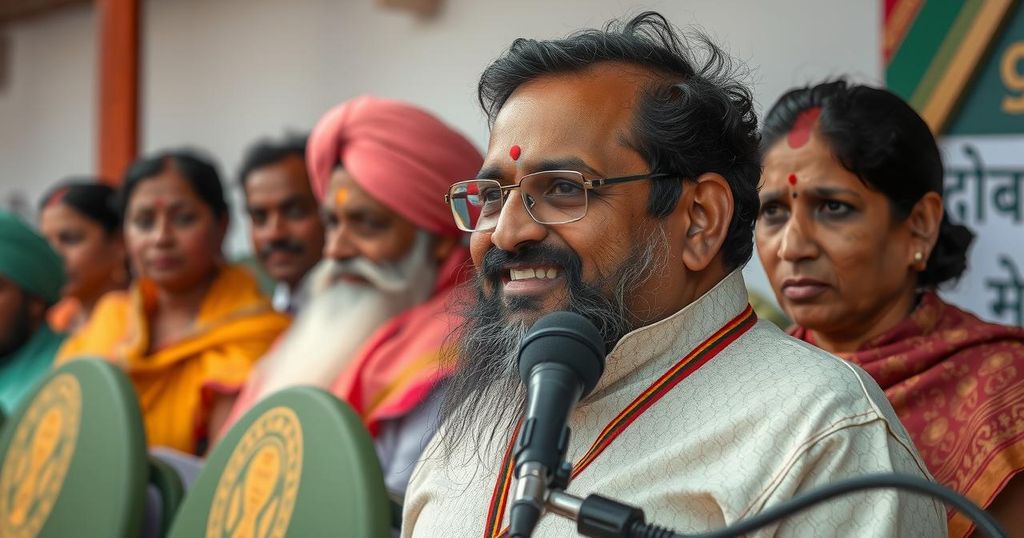A group of expatriate Bangladeshi Hindus has urged India to call for UN sanctions against Bangladesh to protect religious minorities amid rising violence and political instability. They propose completing an unfinished population exchange from the 1947 Partition and creating safe zones for Hindus. The group’s leaders emphasize India’s historical support for Bangladesh and call for urgent action to ensure the safety of the Hindu community.
The expatriate Bangladeshi Hindu community has urged the Indian government to seek United Nations sanctions against Bangladesh, aiming to support and protect Hindus and other religious minorities following the recent political upheaval in Dhaka. This group, largely based in Europe and North America and connected with the Global Bengali Hindu Coalition, has visited New Delhi to engage with political leaders regarding the threats faced by Hindus in Bangladesh after the fall of the Sheikh Hasina government in August.
In a press conference held at the Foreign Correspondents Club, group members presented a five-point agenda. They called for global intervention, including the possible deployment of UN peacekeeping forces to safeguard minorities in Bangladesh. They demanded targeted sanctions against the current government, citing human rights violations and failure to protect religious minorities. Furthermore, they advocated for the completion of the population exchange initiated during the 1947 Partition to facilitate the resettlement of displaced minorities.
The group emphasized the necessity for temporary zones in Hindu-populated areas to ensure the security of minorities. They also recommended reassessing Bangladesh’s peacekeeping contribution, given its historical ties and current situation, thereby urging the Indian administration to reconsider support for their troop deployments.
Sitangshu Guha, a leader from the group based in the United States, underscored India’s historical role during Bangladesh’s liberation in 1971, stating, “India is our best friend; it can help rescue the 20 million Hindus of Bangladesh.” The group expressed urgent concerns that Hindus are facing extinction and called for India’s assistance. The Indian authorities have previously shared their concerns regarding the persecution of minorities with Bangladesh’s interim administration, particularly in light of recent events such as the arrest of a Hindu monk on sedition charges.
Relations between India and Bangladesh have deteriorated since the political unrest that led Sheikh Hasina to seek refuge in India. The interim government has dismissed reports of minority targeting as exaggerated, although group members contest this, reporting ongoing violence against Hindus. In a statement, Arun Dutta, based in Canada, noted the drastic reduction in the Hindu population in Bangladesh, asserting, “If the trucks don’t go [from India], they will go hungry,” highlighting the dependency on Indian goods.
The group referenced a report from the Bangladesh United Sanatani Awakening Alliance, which documented over 50 attacks on Hindu places of worship and community spaces, corroborating their claims of ongoing persecution. This situation underlines the pressing need for international attention and intervention to address the violations occurring against religious minorities in Bangladesh.
The call for action by expatriate Bangladeshi Hindus arises from a concerning trend of violence and discrimination against Hindus in Bangladesh, particularly following the political changes that have led to increased tensions. With the Hindu population in Bangladesh declining significantly since the 1950s, the community is currently facing exacerbated risks and fears for their existence. The involvement of international bodies like the UN and the response of neighboring India are critical focal points in efforts to secure protection and recognition of the rights of these minorities.
The expatriate Bangladeshi Hindu group’s appeal for UN sanctions and Indian intervention highlights a dire situation for Hindus in Bangladesh amidst political instability. Their demands underscore the necessity for international oversight to protect minority rights and restore peace. These developments may pave the way for a strategic realignment in Indian foreign policy concerning Bangladesh, focusing on humanitarian and cultural ties rather than solely on economic interactions.
Original Source: www.hindustantimes.com






